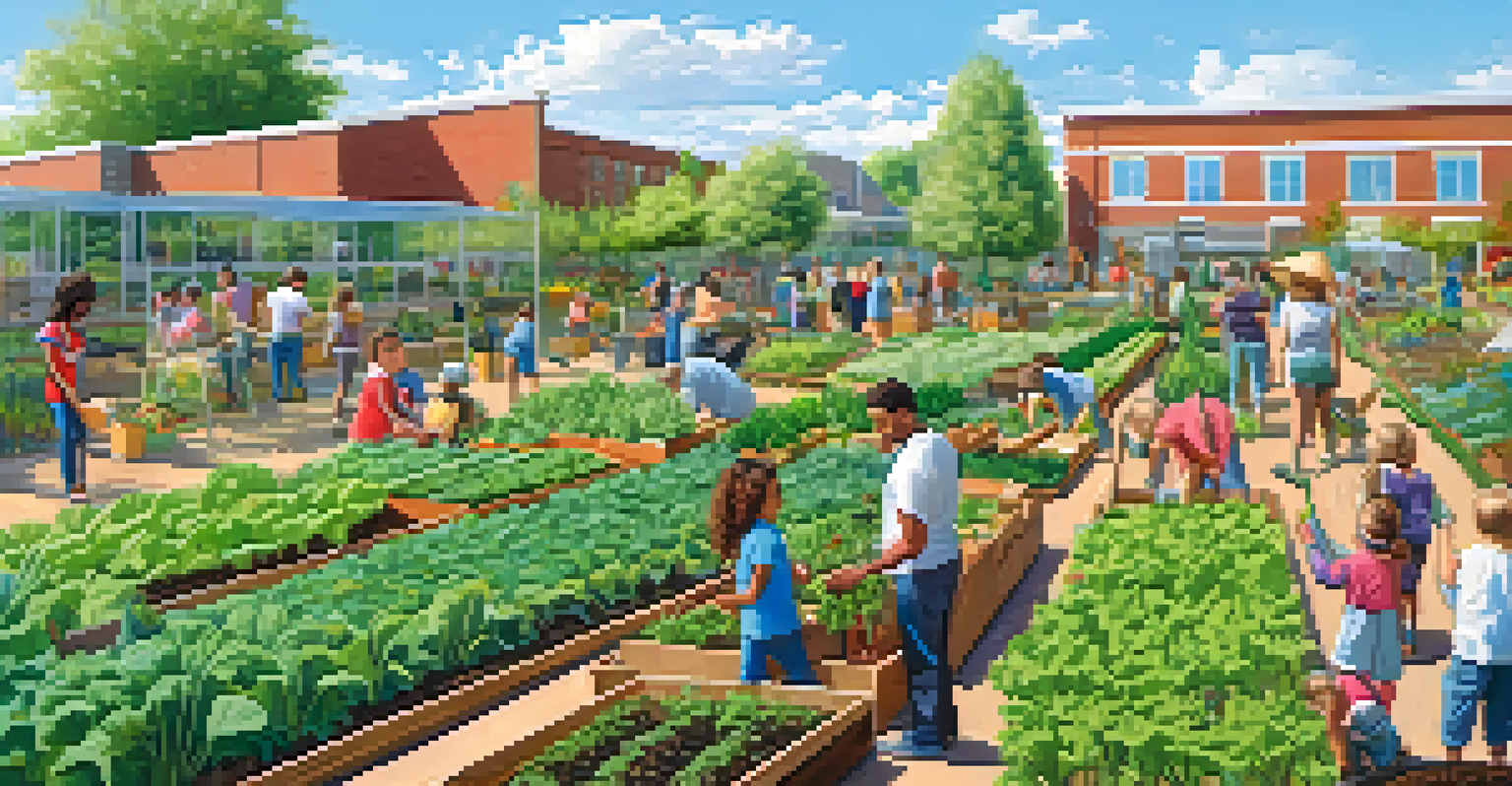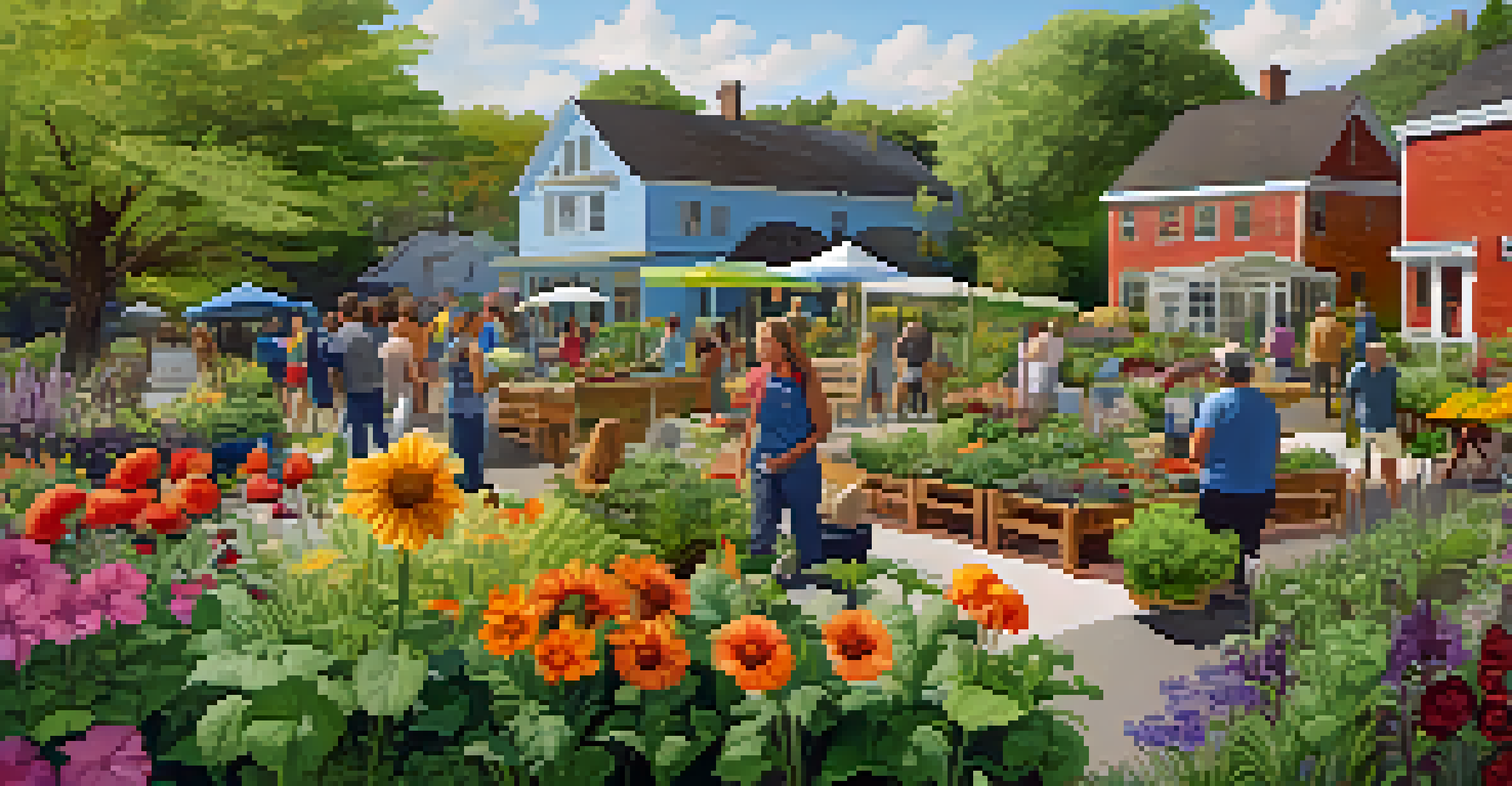Top 10 Urban Farming Initiatives in Denver to Know

1. The GrowHaus: A Community Food Hub
The GrowHaus stands out as a vital community food hub in Denver, dedicated to promoting food justice and sustainability. This urban farm offers a unique combination of education, production, and distribution, making it a cornerstone of the local food movement. Visitors can participate in workshops and volunteer opportunities that empower them with gardening skills and knowledge about healthy eating.
In every walk with nature, one receives far more than he seeks.
One of the standout features of The GrowHaus is its greenhouse, which produces fresh produce year-round, even in Denver's chilly winters. This innovative approach not only supplies the community with nutritious food but also engages local residents in the farming process. By fostering a sense of ownership and responsibility, The GrowHaus cultivates a strong community spirit.
Additionally, The GrowHaus collaborates with various local organizations to increase access to healthy foods in underserved neighborhoods. Their commitment to social equity makes them a model for urban farming initiatives, illustrating how food systems can be both sustainable and inclusive.
2. Urban Farm at Stapleton: Growing Together
The Urban Farm at Stapleton is a prime example of how urban spaces can be transformed into productive gardens. This 23-acre farm serves as a hub for community engagement, providing hands-on experiences for people of all ages. Here, families can learn about growing food while enjoying the outdoors, making it a beloved local destination.

This initiative focuses on sustainable practices, utilizing organic gardening methods that respect the environment. The farm also emphasizes the importance of local food systems by selling fresh produce directly to the community. This farm-to-table approach not only supports local economies but also encourages healthier eating habits.
Community Food Hubs Empower Locals
Urban farms like The GrowHaus and The Urban Farm at Stapleton provide hands-on experiences that educate and engage residents in sustainable food practices.
Through workshops and volunteer days, The Urban Farm at Stapleton fosters a strong sense of community. Participants often share their gardening experiences, creating a supportive network that inspires others to get involved in urban farming.
3. Denver Urban Gardens: A Network of Green Spaces
Denver Urban Gardens (DUG) is a remarkable initiative that manages over 100 community gardens throughout the city. This extensive network allows residents to cultivate their own plots while building connections with their neighbors. DUG’s mission is to empower communities, promote sustainable practices, and increase access to fresh produce.
The greatest threat to our planet is the belief that someone else will save it.
Participating in DUG means more than just gardening; it’s about community building. Many of the gardens host events that bring people together, from potlucks to educational workshops. These gatherings foster friendships and deepen connections among residents, making the gardens vibrant social hubs.
Additionally, DUG provides resources like gardening classes and youth programs, ensuring that everyone has the opportunity to learn about growing food. By nurturing both plants and people, DUG is cultivating a greener, healthier Denver.
4. The Urban Farm: A Model of Sustainability
The Urban Farm is a beloved institution in Denver, dedicated to sustainability and education. With over 8 acres of land, this farm focuses on growing organic vegetables while providing educational programs for the community. Their commitment to environmental stewardship makes them a leader in urban agriculture.
Visitors to The Urban Farm can participate in hands-on workshops that cover everything from composting to livestock care. These programs empower individuals to adopt sustainable practices at home, contributing to a more environmentally conscious community. The farm’s educational approach ensures that knowledge about sustainable farming is passed down to future generations.
Diverse Gardens Foster Community Bonds
Initiatives such as Denver Urban Gardens and Swallow Hill Community Garden create vibrant social spaces that connect neighbors through shared gardening experiences.
In addition to its educational efforts, The Urban Farm also fosters community through its volunteer opportunities. By bringing people together for a common cause, the farm strengthens community ties and enhances the local environment.
5. Swallow Hill Community Garden: A Hidden Gem
Tucked away in the heart of Denver, the Swallow Hill Community Garden is a true hidden gem. This small but vibrant garden is a testament to the power of community involvement. Residents come together to cultivate their plots, sharing knowledge and resources while enjoying the fruits of their labor.
What sets Swallow Hill apart is its emphasis on biodiversity. The garden features a variety of plants, including flowers, herbs, and vegetables, creating a rich ecosystem. This diversity not only supports pollinators but also encourages a more resilient garden that can withstand pests and disease.
The community spirit at Swallow Hill is palpable, with neighbors often sharing harvests and gardening tips. This sense of camaraderie enhances the gardening experience, making it a cherished space for everyone involved.
6. Green Spaces: Urban Parks with a Purpose
Green Spaces is an innovative initiative that transforms underutilized urban land into productive gardens. By partnering with local communities, they create green spaces that serve both ecological and social purposes. These gardens not only beautify neighborhoods but also provide fresh produce to residents.
One of the unique aspects of Green Spaces is their focus on creating edible landscapes. This approach integrates food production with traditional landscaping, making urban environments more sustainable. By planting fruit trees, berry bushes, and vegetable gardens in public parks, they promote local food access in a creative way.
CSAs Strengthen Local Food Systems
Community Supported Agriculture (CSA) programs link consumers directly with local farmers, promoting sustainable practices and healthier eating habits.
Through community engagement, Green Spaces encourages residents to take pride in their local environment. Their projects often involve volunteers who help maintain the gardens, fostering a strong sense of ownership and community spirit.
7. Farm at the Denver Botanic Gardens: Education Meets Nature
The Farm at the Denver Botanic Gardens is a unique blend of education and nature, offering visitors a chance to learn about sustainable farming practices. Set against the stunning backdrop of the gardens, this urban farm showcases a variety of crops and techniques. It serves as an educational resource for those interested in horticulture and sustainability.
Visitors can participate in workshops and demonstrations that cover topics like organic gardening and permaculture. These hands-on experiences are invaluable for anyone looking to deepen their understanding of sustainable agriculture. The Farm’s commitment to education makes it a vital part of Denver’s urban farming landscape.

Moreover, the Farm collaborates with local schools and community groups to promote environmental stewardship. By engaging youth and adults alike, the Farm fosters a culture of sustainability that extends beyond its borders.
8. Community Supported Agriculture (CSA) in Denver
Community Supported Agriculture (CSA) programs are gaining popularity in Denver, connecting local farmers directly with consumers. These programs allow residents to subscribe to receive fresh produce regularly, supporting local agriculture while promoting healthy eating. CSAs foster a direct relationship between farmers and consumers, creating a sustainable food system.
By participating in a CSA, members not only receive fresh, seasonal produce but also support local farmers during the growing season. This model encourages biodiversity and sustainable farming practices, as farmers are incentivized to produce a variety of crops. It's a win-win situation for both the community and the environment.
Many CSAs in Denver also offer opportunities for members to visit the farms and participate in events. These experiences help build a sense of community and connection to the food we eat, fostering a deeper appreciation for local agriculture.